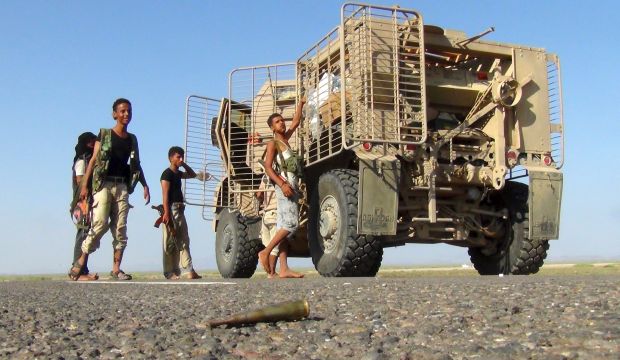
Militants loyal to Yemen’s government stand next to an armored vehicle at the frontline to fight against Houthi militants in control of the Bab El-Mandeb Strait, which links the Red Sea to the Gulf of Aden, in the Yemeni governorate of Taiz, on October 3, 2015. (REUTERS/Stringer)
“No peace [agreement] can be reached with this extremist group unless it hands over its weapons [to the government],” Ezz Al-Din Al-Asbahi, Yemen’s Human Rights Minister, said in an interview with Asharq Al-Awsat on Friday, expressing hope that the Iran-allied group will return weapons depots and military bases it has seized from the government.
Asbahi’s remarks coincide with the UN Envoy Ismail Ould Cheikh Ahmed’s return to Yemen to resume peace efforts aimed at ending the conflict that pits loyalists to the Gulf-backed government of President Abd Rabbuh Mansur Hadi against an alliance of Houthi rebels and supporters of ex-president Ali Abdullah Saleh.
“We appreciate the great efforts [of the UN] for they are dealing with a party that does not know a thing about international law or … diplomatic rules,” Asbahi said of the Houthi movement that continues to occupy large parts of Yemen despite a UN Security Council resolution calling for its withdrawal.
Once disarmed, Asbahi argued, the Houthi group will lose its influence which he attributed to its seizure of weapons depots and military bases from Hadi’s government in coordination with Saleh’s forces.
He said: “The Houthi-Saleh alliance is incapable of building a country, society or institutions. It lacks a vision for the future and all it does is cause harm to innocent citizens.”
Earlier this month, the Houthi group and Saleh’s party notified UN chief Ban Ki-moon that they were ready to join talks on a settlement based on a seven-point peace plan proposed by the UN in talks in Oman in September.
“We want from them two lines only saying: ‘We abide by the legitimacy and the UN resolution’; not just a letter addressed to the UN secretary-general,” Asbahi said.
Meanwhile, Major General Ja’afar Mohamed Sa’ad, the newly appointed governor of Aden, arrived to the strategic southern city from Saudi Arabia on Friday.
The appointment of Sa’ad, who replaced Nayef Al-Bakri, comes as the city is going through exceptional circumstances caused by fighting between the Houthis and Hadi’s loyalists in mid-July.
Government loyalists, backed by Saudi-led airstrikes and ground troops, have driven out the Houthis from Aden, and advanced towards the capital, Sana’a, which remains under rebel control since September of 2014.
